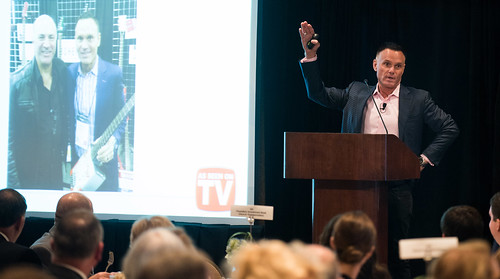‘Shark Tank’ star Kevin Harrington to help Auburn honor business leaders
Article body
Original ABC "Shark Tank" panelist and serial entrepreneur Kevin Harrington will help Auburn University celebrate the success of alumni and student business leaders when the Raymond J. Harbert College of Business hosts the Auburn University Entrepreneurship Summit Friday, April 22, at The Hotel at Auburn University and Dixon Conference Center.
The daylong program will feature the finals of the Tiger Cage student entrepreneurship competition at 9 a.m., and the Auburn University LAUNCH Innovation Grant Program Faculty Pitch Competition at 10:15 a.m. Both events are free and open to the public. Top individual entrepreneurs and fast-growing companies led by Auburn alumni will be recognized at the Top Tigers awards luncheon at 11:15 a.m. Individual Top Tigers tickets are $100, while tables may be purchased for $800. Tickets may be purchased online.
More information about summit is available.
Harrington will serve as the keynote speaker for the Top Tigers luncheon and as a judge for the Tiger Cage competition. Fans of "Shark Tank" will remember Harrington as one of the investors and judges who grilled aspiring entrepreneurs about their business concepts and product ideas during the show's first three series, but they may not know how he made his fortune. In 1984, Harrington produced one of television's first 30-minute infomercials. Known for the "As Seen on TV" product line, Harrington has launched more than 500 products that have generated more than $5 billion in sales worldwide.
Hosted in partnership with Business Alabama magazine and Warren Averett CPAs and Advisors, the Top Tigers luncheon will recognize 60 fast-growing companies founded, owned or led by Auburn University alumni. The Harbert College of Business will also honor Chicken Salad Chick Co-Founder and vice president of Brand Development Stacy Brown as the university's Entrepreneur of the Year and Bellhops Co-Founder and CEO Cameron Doody as Young Entrepreneur of the Year.
Brown, a communications graduate, founded Chicken Salad Chick in the kitchen of her Auburn home in 2008. After learning that the county department would not allow her to sell food made in her home kitchen, Brown and her late husband, Kevin, opened a small takeout restaurant. The fast casual chain has grown to include 50 restaurants across the Southeast and now includes locations in North Carolina, Texas and Louisiana.
Doody, who earned a supply chain management degree from Auburn, and fellow Harbert College of Business alum Stephen Vlahos launched what has been described as "Uber for moving." Bellhops connects able-bodied college students with businesses and individuals who need help with small- to medium-scale moves. Based in Chattanooga, Tennessee, Bellhops now serves more than 130 cities coast-to-coast. The company raised $13.5 million in Series B funding in 2015 and counts Canaan Partners, Lowercase Capital, Binary Capital, Reddit co-founder Alexis Ohanian, PayPal board member Scott Banister and rapper Nas among its investors.
Auburn University's future business leaders will also be on display during the finals of the Tiger Cage competition, which began with 30 teams. Four finalists will make pitches to a panel of judges with more than $20,000 in prizes at stake. Three teams from the inaugural Tiger Cage competition in 2015 have launched businesses.
Related Media
Media interested in this story can contact Communications Director Preston Sparks at (334) 844-9999 or preston.sparks@auburn.edu.
Auburn University is a nationally ranked land grant institution recognized for its commitment to world-class scholarship, interdisciplinary research with an elite, top-tier Carnegie R1 classification, life-changing outreach with Carnegie’s Community Engagement designation and an undergraduate education experience second to none. Auburn is home to more than 30,000 students, and its faculty and research partners collaborate to develop and deliver meaningful scholarship, science and technology-based advancements that meet pressing regional, national and global needs. Auburn’s commitment to active student engagement, professional success and public/private partnership drives a growing reputation for outreach and extension that delivers broad economic, health and societal impact.





